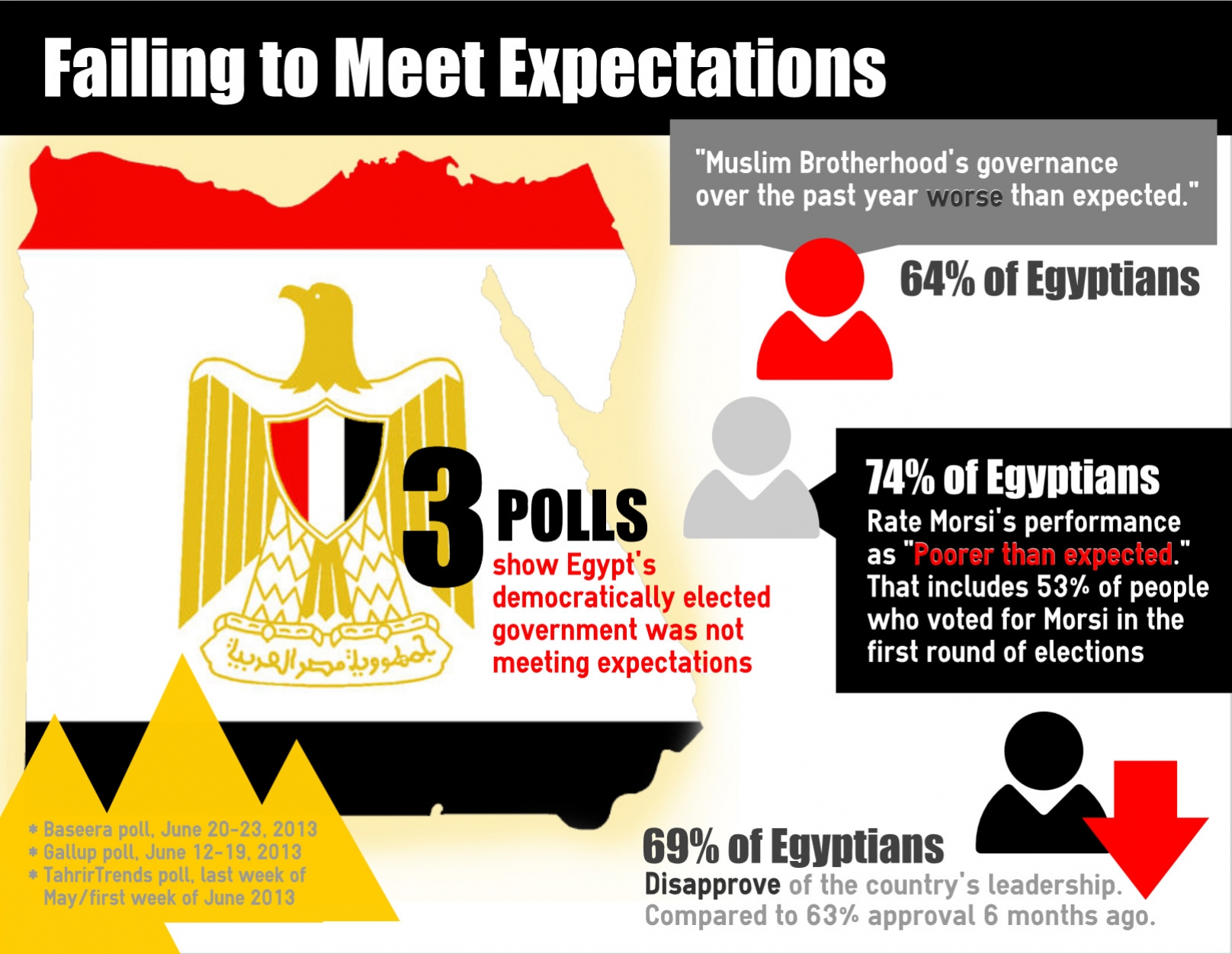 This article should begin with the explicit acknowledgement that the author, as you might have guessed on seeing the byline, is not Egyptian. Thus, it is inherently that much more dangerous, as an outsider, to speak about what it seems the Egyptian people want. Of course, given the limited extent of public opinion polling in Egypt, such pronouncements from any person should be taken with at least a few grains of salt—broad declarations about the desires of any group of eighty-million-plus will naturally tend towards rendering the population as a monolith, and if one thing has been demonstrated since June 30, it is that the Egyptian population is anything but monolithic.
This article should begin with the explicit acknowledgement that the author, as you might have guessed on seeing the byline, is not Egyptian. Thus, it is inherently that much more dangerous, as an outsider, to speak about what it seems the Egyptian people want. Of course, given the limited extent of public opinion polling in Egypt, such pronouncements from any person should be taken with at least a few grains of salt—broad declarations about the desires of any group of eighty-million-plus will naturally tend towards rendering the population as a monolith, and if one thing has been demonstrated since June 30, it is that the Egyptian population is anything but monolithic.
With that said, it is wholly accurate to say that people elect governments with the goal of having them meet their needs as citizens. Those needs generally fall into a number of areas—economic, health, public safety, national defense, et cetera. Governments that ignore the multiplicity of needs spelled out by the people will find themselves imperiled either at the ballot box or (in some cases) in the streets. As seen throughout history, governments may be legitimately removed through either venue, though the bar for legitimacy in the latter case is certainly held to be much higher.
It is also generally, if not completely, accurate to say that people do not elect governments purely on sociocultural agendas. As mentioned, people have many needs, and rarely are these needs satisfied primarily by the implementation of the sociocultural agenda of whomever they have elected. In Egypt, this reality is immediately apparent, and the fact that the Morsi government (and the Freedom and Justice Party) significantly privileged the pursuit of its sociocultural agenda—demonstrated generally through its exclusionary attitude towards other political actors and particularly through its ramrodding of the constitutional process—should immediately have caused worry. Broadly, Egyptians did not elect either Morsi or a plurality-FJP legislature in order to empower a narrowly-focused movement—they elected them to govern with a focus on addressing the tremendous problems facing the country. In particular, it is generally accepted that Morsi’s victory should be regarded more as a rejection of Shafiq than an endorsement of Morsi and his politics.
Despite the lack of consistent, reliable public polling in Egypt, three recent polls (from the Egyptian Center for Public Opinion Research [Baseera], Gallup, and the newly-formed TahrirTrends), do help to demonstrate that Egyptians had generally lost faith in their government. Notably, these polls, all conducted in the weeks leading up to June 30, also show that the people had largely held out hope for the success of the government. Indeed, the extent to which the hopes and expectations of the people were not met can be seen as the people indicating their rejection of then-current government.
 This work is licensed under a Creative Commons Attribution-NoDerivs 3.0 Unported License.
This work is licensed under a Creative Commons Attribution-NoDerivs 3.0 Unported License.
The Baseera poll, in the field from June 20-23 and analyzed by Magued Osman, showed that nearly two-thirds (64 percent) of Egyptians felt that the “Muslim Brotherhood’s governance over the last year [had been] worse than they expected.” Not only does this reflect major discontent with the present state of affairs, but importantly, it underlines that a clear majority of Egyptians expected the government to have done better than it did. Only 15 percent believed that the government had performed as well as they had expected it to—very few Egyptians believed that the government would inevitably perform poorly. Somewhat surprisingly, 59 percent of Egyptians believed that, had the SCAF remained in power, the “nation’s status would be better by now”—though the high esteem generally accorded to the military may explain this, it suggests that many considered even the tumult of the SCAF era to be preferable to what followed. An astounding 73 percent of those surveyed felt that Morsi “had not taken any good decisions” in his first year (15 percent felt he had not made any bad decisions).
The Gallup poll, in the field from June 12-19 and analyzed by Mohamed Younis, revealed a major fall in confidence in the national government following the most recent prior poll (in the field from November 16-23, 2012). The November poll showed 57 percent of Egyptians as having confidence in the national government, with 34 percent expressing no confidence. Noting that Morsi’s constitutional decree was issued on November 22, this poll largely reflected opinions formed prior to that major event. The June poll, for its part, revealed that 66 percent of Egyptians professed no confidence in the national government, with only 29 percent indicating confidence. The June poll also indicated that 69 percent “disapproved of the country’s leadership,” a noteworthy fall from 63 percent approving in November 2012. Interestingly, the FJP polled even less well, with 73 percent expressing no support for the party (19 percent expressed support).
Finally, the TahrirTrends poll, conducted in the last week of May and the first week of June 2013 and discussed by H. A. Hellyer, shows most conclusively that the expectations of the Egyptian people had not been met by the government (including both the legislature and the presidency). The poll revealed that 66 percent of Egyptians expected Morsi to do a good job in office, and 59 percent expected the FJP to do a good job in the legislature (11 percent and 14 percent expected average performance, respectively). When asked how the president and parliament had actually performed, 74 percent and 72 percent responded “poorer than expected,” respectively. Even among people who had voted for Morsi in the first round of elections, 53 percent and 56 percent reported that the president and FJP, respectively, had performed “poorer than expected.”
To some extent, it is not surprising that the people expressed such uniformly negative opinions on their government in the three recent polls. It is clear to all that the problems facing Egypt are enormous, and solving them will require considerable time and effort. Certainly, expectations for any new government in Egypt were bound to be high, and any government would likely fail to live up to those expectations. Still, the extent to which it is evident that the prior government was failing to satisfy the Egyptian people is indicative of not only the enormity of the problems that the government faced, but also the choices that it made regarding the prioritization of its efforts while in power. Instead of trying to foster a broadly inclusive governing environment that was focused on meeting people’s needs, Morsi and the FJP primarily set off on an exclusionary course that focused on pursuing narrow political goals afforded by their then-favorable position.
Egyptians thus faced a situation where they had elected a leader in whom many had lost confidence and over whom they held no levers of power—there existed no functional way either to constrain Morsi’s actions or, if necessary, remove him from office. Recall that Tamarod’s original goal was to give the people a lever over the president by creating a political situation that would force him to call for early elections. Given the degree to which Egyptians appear to have become dissatisfied with their government, it is possible that these early elections would have resulted in Morsi’s loss. Of course, as events played out, it became clear that Morsi would not accede to any such referendum—the activists’ call then shifted to demand his ouster, and the military ultimately stepped in to, as they have since put it, prevent a descent into civil war.
Here, it must be acknowledged that the appropriateness of the military’s intervention is questioned even by those who were most ardently opposed to Morsi, and certainly no poll conducted prior to July 3 can claim to reveal the opinion of the people on the military’s action. This particular question is one that, to a significant degree, awaits resolution, and it is conceivable that people’s opinions on it will evolve as the future course of the country becomes clearer. If the next elected government proves able to the task of governing Egypt, some people may well express greater approval of the military intervention than if the next government proves as inadequate as the first. The question of whether the people believe that interim government was right to clear the protest camps in the manner that it did—arguably its most significant act thus far—is also a separate issue, although a recent Baseera poll asking this question shows that 67 percent of Egyptians express satisfaction with the government’s action.
Ultimately, both the interim government and the government to come must learn from current events. People want the issues that most affect their lives—indeed, their very ability to live—to be addressed. They will not tolerate any government that, instead of seeking broadly-supported economic and governmental reforms, seeks narrow political gain in service of narrow sociocultural goals. In fact, the negative political fallout of the Brotherhood’s one year in power can be seen in a Baseera poll conducted at the end of August in which 69 percent of those polled did not approve of the Freedom and Justice Party’s continued participation in politics.
In any democratic system, legitimacy is given to an elected government by the ballot box, but it is kept by that government only to the extent that its actions while in office allow it to maintain the consent of the governed. While it is certainly true that “the people lack confidence in the government” is not the same as “the people withdraw their consent from the government,” the link between the two is undeniable, and if consent is withdrawn, no government can maintain a claim to democratic legitimacy.
We will never truly be able to know if that specific conclusion—that the people withdraw their consent from the government—is where Egyptian public opinion as a whole was going, but it is not a stretch to imagine that it would have gotten there. A sufficient number, having seen that the actions of their elected leaders were not benefitting them—and fearing that some of those actions would make true democratic developments more difficult in years hence—were clearly willing to express a demand for early elections, and if a country that has seen as many votes in recent years as Egypt wanted to have yet another one, it is not likely because they wished to reaffirm the mandate given to those who were already in power. It is instead more likely that they wished to give their consent—and legitimacy—to others.
David Johnson works as the Research Director for the Tahrir Institute for Middle East Policy. Prior to joining the Institute, he worked for a research consultancy focused on education and business. He holds a master’s degree from American University’s School of International Service and graduated from Case Western Reserve University with a degree in economics and political science. He tweets at @whodan2.
Image: Photo: Egypt Presidency
